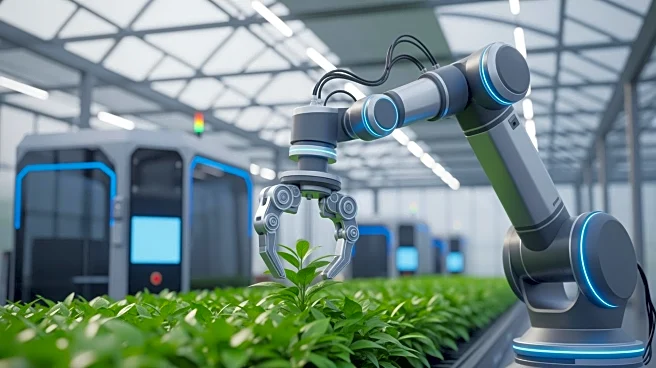What's Happening?
The World Economic Forum (WEF) has released a report emphasizing the transformative potential of seven emerging deep technologies in agriculture. These include generative AI, robotics, satellite-enabled
remote sensing, computer vision, edge Internet of Things (IoT), CRISPR, and nanotechnology. The report, titled 'Shaping the Deep-Tech Revolution in Agriculture,' was developed in collaboration with industry and academic stakeholders. It highlights the role of these technologies in boosting resilience and productivity while securing rural livelihoods. The report comes at a time when agriculture faces multiple crises, such as rural-to-urban migration, climate extremes, and degradation of natural resources like soil and water.
Why It's Important?
The significance of this development lies in its potential to address pressing agricultural challenges. With the global population expected to rise significantly by 2050, the demand for food production will increase. However, with one-third of the world's soil degraded and aquifers depleted, innovative solutions are crucial. The technologies identified by the WEF could fundamentally change how crops are grown, monitored, and distributed, enhancing productivity and sustainability. This could lead to improved yields, reduced emissions, and better supply chain management, benefiting farmers and the agricultural sector at large.
What's Next?
The WEF calls for scaling deep-tech innovations to reimagine agricultural systems and address existing pressures. It urges governments to adopt agile policies and regulatory sandboxes to keep pace with technological advancements. The report was released by the WEF's Artificial Intelligence for Agriculture Initiative (AI4AI), which has committed to providing digital technologies to over 895,000 farmers in India since 2021. The next steps involve further integration of these technologies into agricultural practices and policy frameworks to maximize their impact.
Beyond the Headlines
The convergence of these technologies could lead to high-impact use cases such as autonomous swarm robotics and precision farm management. These advancements may also promote carbon finance to farmers, encouraging sustainable practices. The ethical and cultural dimensions of integrating AI and robotics into agriculture could reshape traditional farming practices, requiring careful consideration of the implications for rural communities.











